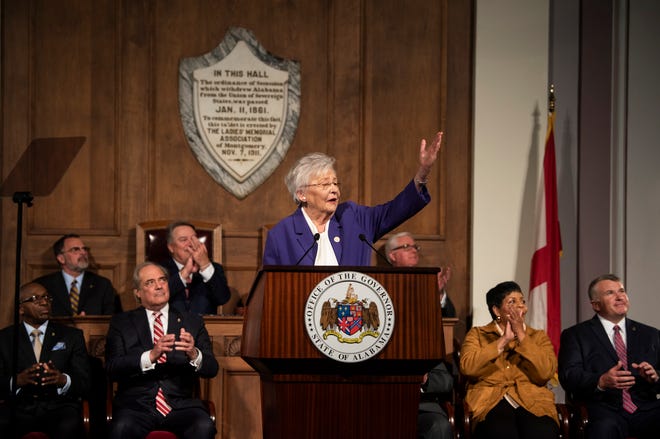Gov. Kay Ivey has continued to make education a top priority in Alabama over the past year, and on Wednesday night her $100 million school choice plan received final approval from the state Senate and has already passed the House. Pending her official signature, the program is scheduled to begin in the 2025-26 school year.
The law, known as the CHOOSE Act, would allocate up to $7,000 in state funds per student for families to use for education-related expenses such as private school tuition, tutoring, and textbooks.
“With the Alabama Senate’s strong approval of the CHOOSE Act, today we finally cleared the final hurdle to enact Alabama’s historic education savings account plan. Our state has a strong public education system. “Every family in Alabama will soon have the right to choose their education savings account for their child's school,” Ivey said in a statement Wednesday. “I look forward to signing the CHOOSE Act.”
The Legislature would be required to appropriate a minimum of $100 million each year to the CHOOSE Act Fund, and the cumulative balance of the fund would be limited to $500 million. If the balance exceeds that amount, the surplus will be returned to the Education Trust Fund.

The first 500 slots are reserved for students with special needs, such as 504 plans or individualized education plans. Initially, the program will be limited to households with incomes below 300% of the federal poverty level, but there will be no income limit for special needs reservations.
By 2027, the program will be available to households at all income levels.
While most state legislators, governors and many parents in the state support the program, public school advocates do not.
Ahead of Wednesday's vote, Montgomery Public Schools Superintendent Melvin Brown called the education savings program a “money pit.”
“Public institutions should be supported by public funds. Private institutions basically shouldn't do that, and what's happening now is a radical change in the situation where public funds are being siphoned off to private institutions.” said Mr. Brown. “I also think this is an effort to further segregate schools, which is not humane. That's not what our society should be about.”
Groups like the Alabama Education Association have also raised concerns that children who need education funds the most will not be able to access savings accounts because the income limit ends after the first two years.
school choice movement
Conceptually, school choice allows families to use public funds to access alternatives to traditional public schools, such as charter schools, private schools, and online learning. The CHOOSE Act also allows participating homeschool parents access to up to $2,000 per student.
In recent years, the school choice movement has grown across the country, particularly in Republican states, as parents look for ways to educate their children outside of public schools.
The COVID-19 pandemic helped fuel the school choice movement as pandemic learning exposed weaknesses in the public education system, according to a report from EducationWeek and the Education Writers Association. Children fell behind in meeting grade-level standards and parents opposed policies such as masks.
“The CHOOSE Act provides students the opportunity to learn and grow in the environment that best suits their needs, and that could be in public schools,” said Rep. Danny Garrett (R-Trussville). I mentioned this at a debate in February.
Garrett is a sponsor of the bill along with Sen. Arthur Orr, a Decatur Republican.
Alabama's program is most similar to those of Arizona, Arkansas, and Oklahoma.
A key point for lawmakers was that parents would not receive the funds directly. Instead, parents can make “recurring payments” electronically to participating education service providers or participating schools.
“Many parents want the opportunity to teach their children a proven alternative learning method,” Ivey said during a visit to Valiant Cross Academy, a private Christian school in Montgomery, earlier this year. “Don’t let that deter you from your determination to give it to your children.”
Criticism from lawmakers

There was a five-hour debate before passing the bill, which included several amendments that did not pass.
Sen. Larry Stutz (R-Tuscumbia) proposed two amendments late in the debate, both of which were tabled. He said, “I don't appreciate being run over like that.''
Sen. Roger Smitherman (D-Birmingham) clarified that money distributed to special needs students must go to the school of their choice, whether private or public. proposed an amendment. As it turned out, it failed.
“We want to put on a good face for certain special interests that won't go away, but the most important interest group is our children, and we're not listening to them,” Smitherman said. said. “We're not showing them that we're sensitive to what's happening to them, we're not showing them that we care.”
Smitherman spoke for more than an hour before the vote, saying he wants this bill to be what's best for Alabama's children.
Sen. Bobby Singleton, D-Greensboro, also criticized the “unintended consequences” of school choice.
“School choice doesn't really mean you have a choice of going somewhere,” Singleton said. “Choice requires money, and depending on the school district, that choice is limited.”
He stressed that the choice depends on which students private schools want to admit.
Singleton proposed an amendment to specify that participating schools must be accredited. That amendment failed. He also proposed an amendment that would have required participating schools to have certified teachers, but that proposal also failed.
“People hate public schools,” he said. “We don't give babies a choice. We give them fanfare.”
Hadley Hittson covers children's health, education and welfare for the Montgomery Advertiser. You can contact her at:hhitson@gannett.com. to support her work,Subscribe to advertisers.


